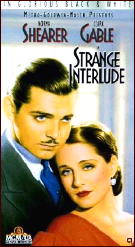Sun 16 Aug 2009
Movie Review: STRANGE INTERLUDE (1932).
Posted by Steve under Films: Drama/Romance , Reviews[2] Comments
STRANGE INTERLUDE. MGM, 1932. Norma Shearer, Clark Gable, Alexander Kirkland, Ralph Morgan, Robert Young, May Robson, Maureen O’Sullivan. Based on the play by Eugene O’Neill. Directed by Robert Z. Leonard (uncredited).

On stage, Strange Interlude was a long experimental play (four and a half hours with a dinner break) that won the 1928 Pulitzer Prize for drama. While the film was cut down to a manageable 110 minutes or so, the experiment of stopping the action and allowing the actors to voice what they were really thinking was carried over to the movie.
It didn’t work then, and it works even less (to a modern audience) now. Using voiceovers while the action stops and the actors try to match facial expressions to what the audience is hearing takes a LOT of getting used to. In these awkward moments, only Clark Gable seems able to deliver his lines in a natural and unforced manner, and that may be in part because he has fewer of them than any of the others.
While certainly abbreviated from the stage version, and abundantly censored in the process, there still remains much in this movie that wouldn’t have passed the provisions of the Hollywood Code that came along a couple of years later. In order to maintain her husband’s sanity (Alexander Kirkland), a woman (Norma Shearer) has an affair (and a child) with another man (Clark Gable) while still in love with a man who died in combat. To complete this five-sided romantic quadrilateral, a fusty old friend of her father’s (Ralph Morgan) is also in love with her but due to his strong ties to his mother, he is unable to tell her.
Her husband assumes the child (later to become Robert Young) to be his, but the strain of keeping the secret from him over the years wears and tears at the relationship between all of them, including the child himself, who for reasons he himself cannot easily explain, hates his “Uncle Ned.”
Mildly fascinating, overall, and as entertaining as a slow motion disaster set in motion by characters who are too weak to prevent it, but at least I now know which play it was that Groucho Marx was parodying in Animal Crackers (1930).
August 16th, 2009 at 10:24 pm
An odd film that doesn’t work, but it does show that Gable’s screen presence could be more important than acting skills. Always nice to see Ralph Morgan get to play something other than the villain in a serial, even in this pretentious mess.
Gable and Shearer also did Idiot’s Delight, another offbeat play to movie that at least has the highlight of Gable doing a soft shoe with a chorus of girls while doing a damn good rendition of “Puttin’ On the Ritz.” Almost as good a Gene Wilder and Peter Boyle in Young Frankenstein.
January 23rd, 2011 at 1:56 am
I’m presently in the process of rereading the plays of Eugene O’Neill in the Library of America edition. Since I just finished STRANGE INTERLUDE I thought I’d view the two video tape version starring Glenda Jackson. I remember seeing the film starring Clark Gable a few years ago and it was not a success at all due to the extensive cuts and censorship. The play is almost 5 hours long and the movie is not even 2 hours.
Just about all of Eugene O’Neill’s plays are very autobiographical and you can see his characteristics in all 3 of the male leads. O’Neill tried to committ suicide at least once and if his marriage and relationships with women were anything like what is shown in this play, then it’s amazing the poor guy didn’t succeed at killing himself.
The play is an intense nightmare showing that Sartre was right: hell is other people and is like a cafeteria where you serve yourself. After taking a few days off I’ll try to watch the Glenda Jackson 3 hour version. It’s got to be better than this film and hopefully I can survive another dip into O’Neill’s nightmare world.